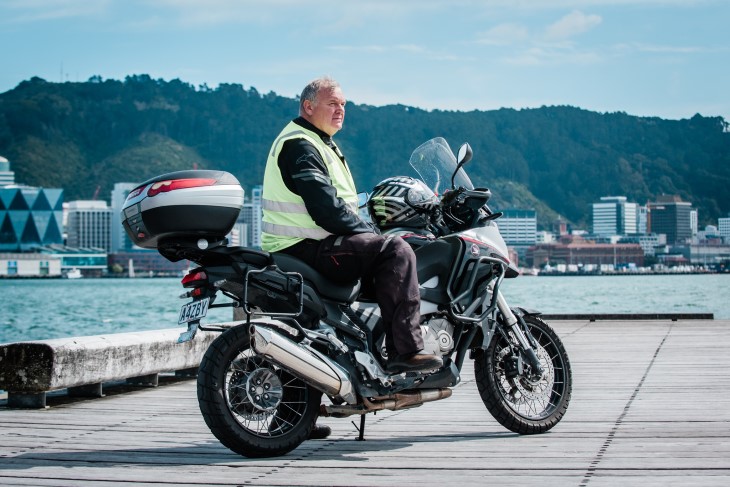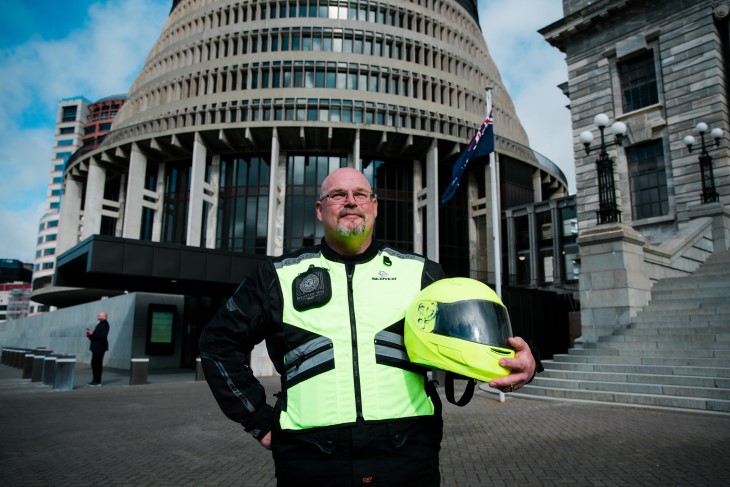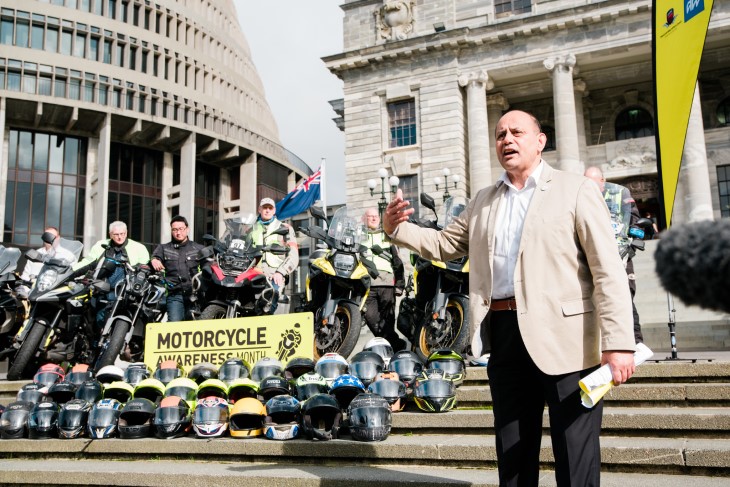Richard’s story: 'It still hurts to talk about it'

He has lost six friends and colleagues to motorcycle crashes. It’s something he remembers every time he gets on his bike. Richard is sharing his story to help others stay safe on our roads.
There’s a moment that Richard Jamieson will never forget.
As a teenager a good mate was killed when his motorbike was hit by a taxi completing a U-turn.
One day he was hanging out with him. The next day he was gone.
“At the funeral his crash helmet was placed onto his coffin and that was heart breaking,” says the 60-year-old Project Manager.
“It still hurts to talk about moments like this. The thoughts of these moments will stay with me forever.”
Richard has been riding motorbikes since he was 10 years old, starting on scooters on grass and progressively moving upwards in his teens.
Over the years, he has witnessed six of his good friends and work colleagues die in motorbike accidents. He can still see their faces and feel their loss.
The crashes have all been different – road incidents, crashes at the track, collisions with cars, U-turns and two bikes crashing head-on – but the galling feeling has always been the same.
“It’s taken its toll over the years,” he says. “I have lost many good people along the way. I am lucky to not have been a victim myself.
“People I’ve worked with, good friends of mine, all gone by doing stupid s... .”

Photo credit: Julia Sabugosa.
The importance of Motorcycle Awareness Month
Motorcycle Awareness Month, an initiative run by ACC and the Motorcycle Safety Advisory Council (MSAC), is important to Richard.
ACC also runs Ride Forever coaching programme for motorcyclists.
Data shows riders who have completed a Ride Forever coaching course are up to 50 percent less likely to lodge a motorcycle-related accident claim than non-trained riders.

The Right Honorable Minister Willie Jackson at the launch of Motorcycle Awareness Month. Photo credit: Julia Sabugosa.
Richard says the death of his friends has given him a personal motivation to make a difference.
On average 50 motorcyclists die every year on our roads.
He is a mentor of the WARS (Wellington Area Road Skills). They meet up each week in summer with a group of 12 mentor riders to talk about road skills and the observation techniques required to safely negotiate our roads and highways.
The qualified engineer has an analytical mind and says he can understand how people can get into trouble on a motorbike.
“It’s a matter of thinking with your head and not with your throttle.”

Photo credit: Julia Sabugosa.
Richard is a firm believer that a motorbike rider holds their safety in their own hands.
“We cause the problems on the road mostly,” he says. “Yes, there are distracted drivers who need to be more responsible and accountable.
“We can change what is happening on our roads and change the number of deaths and serious injury.”
“I was lucky to survive”
Richard is speaking from experience. When he was 21, he was involved in a serious motorbike crash which could have claimed his life.
He was studying to be an engineer and he was heading home.
The car on the other side of the road came up the hill wide on a corner on the northern side of Paekakariki hill. He went over the centre line and came close to wiping Jamieson out.
Richard had the option of hitting the car or taking to the berm. He hit the berm. The belly of his motorcycle bottomed out and threw him over the handlebars.
“I was lucky to survive,” he says. “If I had gone another metre I was down the bank and heading towards a sheer drop. The bike was trashed.”

Photo credit: Julia Sabugosa.
Richard didn’t break any bones. His worst injury was suffering a deep graze on his hip and muscular strains from being contorted.
“It was a good example of how you have to treat everybody on the road as an idiot.”
The driver never stopped.
Creating motorcyclists that are enduring
Richard invests his time and experience in WARS to help others.
The goal is to create motorcyclists that are enduring.
“The saying we often use is ‘There are bold motorcyclists and old motorcyclists – but there is no old and bold motorcyclists’,” he says.
“I’m keen to teach them to be calmer and not get sucked into stupid situations.”
An example of a night on the road includes scanning and head-checks.
“Head checks is looking behind you before you make a move, change lanes or position on the road,” he says.
“Scanning is about the forward vision for short stuff, three seconds away potholes, shiny white lines and out to the vanishing point and positioning your bike so you are not going to hit those things.”

Photo credit: Julia Sabugosa.
At the end of each ride, they debrief and check their ability to observe.
He believes his mentoring work is the ideal complement alongside the Ride Forever programme.
WARS mentors have all undergone additional training, Ride Forever providers from the RightWay Training Academy come into WARS and work with their mentors.
Ride Forever is aimed at giving riders sound information and access to training, so they can make better choices.
“Once riders have the base skills, the Ride Forever programme is really awesome,” he says. “It brings a lot of great advice to riders where bad habits may have formed.”
Motorbikes are in my blood
For as long as Richard can remember, motorbikes have been his life.
He has his own bike collection. He fixes bikes and runs several events for the motorbike community.
His grandfather, father, uncle and brother have all raced motorbikes.
“I come from a line of petrol heads and there was no hope for me,” he says with a laugh.
Richard Is six foot five tall and 140kg.
“I could never race a motorbike because I am too large, but I want to be involved in other ways.”
He says the camaraderie in the motorcycle scene in Aotearoa is very special.
“Riding together is important for our friendships and spending time with our brothers. That is really important to me.
“Sometimes you meet and talk with people who have problems in their lives. We are proactive in trying to help if we can.”
It’s a theme that runs into his motorcycling events where they support causes like suicide awareness and prostate cancer.
“I take a huge sense of achievement in helping those groups,” he says.
“I have been taking from motorcycling my whole life – getting the selfish pleasure out of riding - and I want to give back.”




